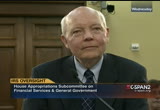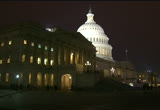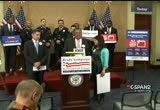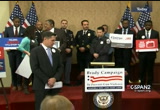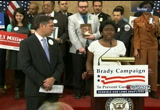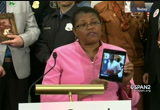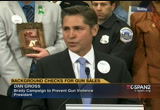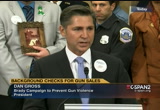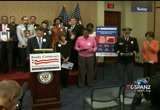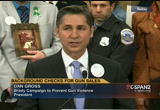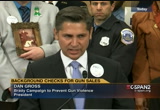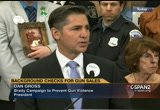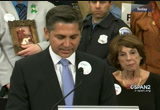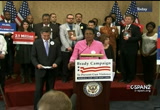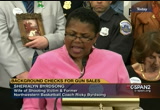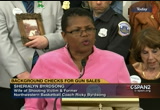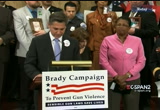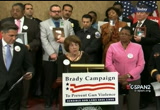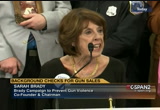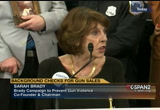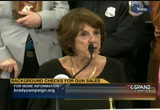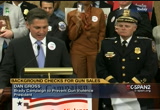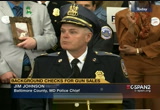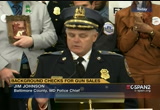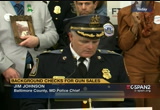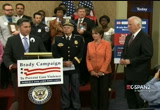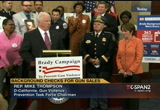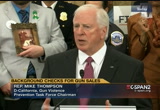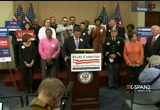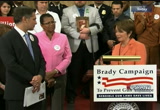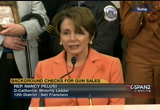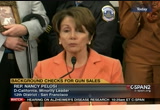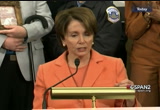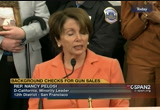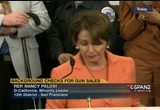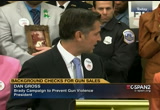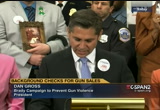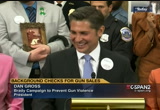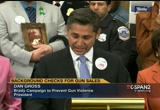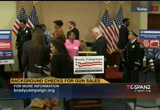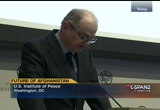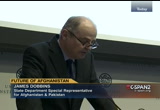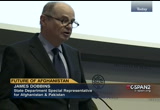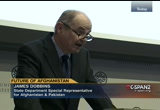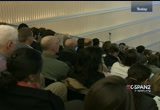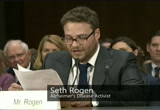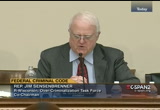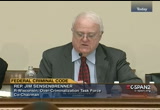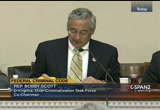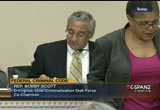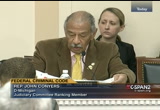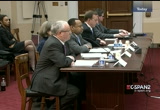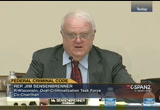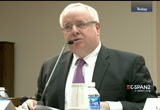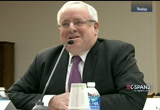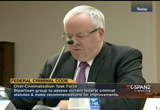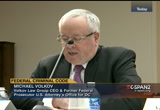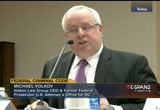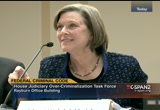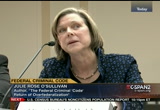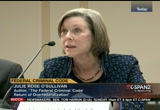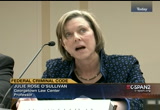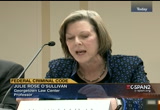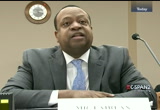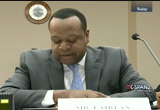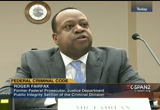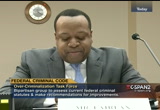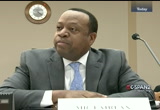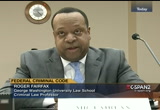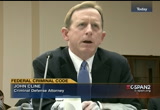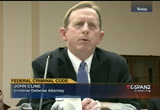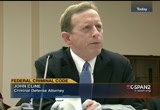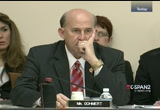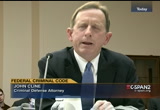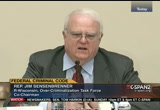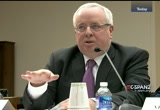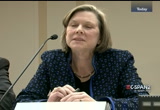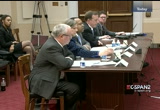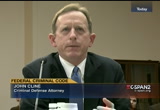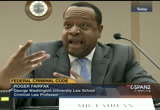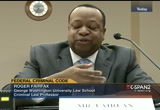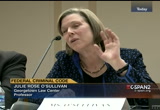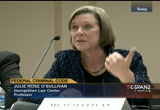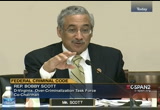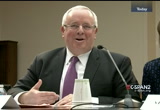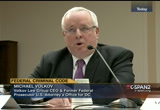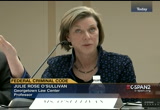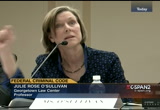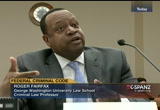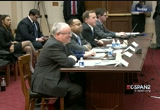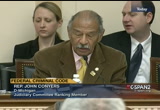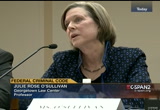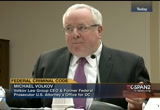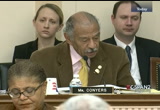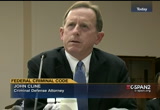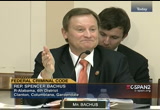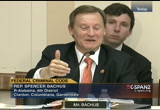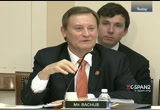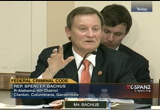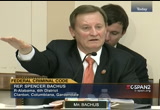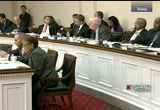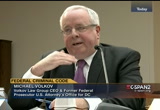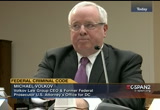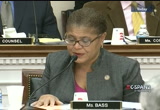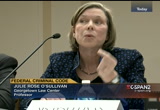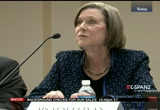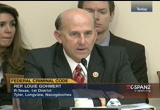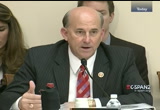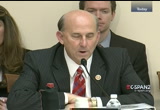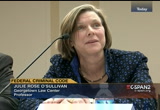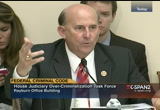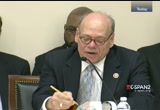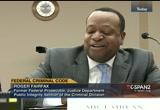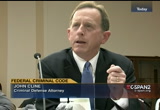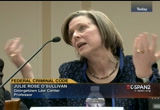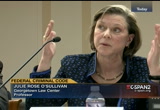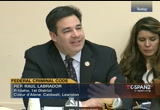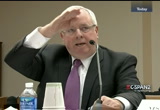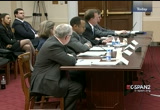tv Key Capitol Hill Hearings CSPAN February 28, 2014 8:00pm-10:01pm EST
8:00 pm
all of the things you do, we aprecate. we will have the second panel coming along >> thank you, mr. chairman. >> coming up, an event recognizing the brady handgun prevention act. and then changes to the federal criminal code. then a discussion about the people in the united states who are under the age of 35 and not registered citizens. &% today the brady campaign recognized the 20th anniversary of the so-called brady law that required background checks for guns. this event highlighted some of
8:01 pm
the laws benefits since enacted in 1994. this is 40 minutes. >> good morning. i am dan gross. president of the brady campaign to prevent gun violence. we are pleased to be here to release our now report and celebrate the 20th anniversary of the brady law. we want to start with showing why we are here and why the mission is important and why we cannot ever give up. >> good morning. i am kenny barns. i live in washington, d.c. and i am a victim of senseless gun violence. this is kenny, jr. he was
8:02 pm
killed september 24, 2001 right here in washington, d.c. on the corner of 11th and u-street northwest. a victim of senseless gun violence. >> good morning. i am eddy wine and on february 2nd 1981 my mother was shot to death in front of me and the gun was turned on me but luckily it malfunctioned. i am here with other victims to demand the job be finished. >> i am dr. crystal and i am here on behalf of my husband who was robbed and murdered on
8:03 pm
august 11th, 1972 in the streets of east orange, new jersey. it seems like yesterday. my family still misses him. on behalf of other families, let's finish the job. >> i am peter reed my daughter mary was one of 32 students and faculty who were shot to death on april 16th, 2007 at virginia tech. we believe with better background these tragedies can be prevented. >> my name is raven burgess. i am a survivor of gun violence. i was shot may 29th, 2013. i am here to promote and help ensure that this ends.
8:04 pm
thank you. >> my name is alex and i'm here on behalf of my sister who was killed by a stalker who purchased a gun on the internet without any kind of background check. i can here to help prevent this from happening like to anyone else. >> i am cheryl and i am here in honor of my husband who was the northwestern basketball coach. he was killed in 1999 by a man who was a convicted felon but inspin spite of that was able to buy a gun without a background from a
8:05 pm
licensed dealer. >> i am sarah brady and i am here on behalf of jim brady who was wound on the assassination attempt of ronald regan. >> i am dan gross and i am here for my brother matthew who was shot in the head on top of the empire state building and for the 90 americans who are killed every day by a bullet and for everyone of else who wants to live in a safer nation. today we are here to mark the o
8:06 pm
20-year anniversary of what could be called the greatest step forward toward a goal of a safer nation. the brady handgun violence act took affect 20 years ago. to introduce this special report that we have issued to celebrate the success of the legislation and to define the critical work that is ahead. 20 years of background checks and keeping america safer. i would like to thank the special guest. the victims and families that have joined us here today. i speak for all of the us here and so many across american when i say how much you inspire us to
8:07 pm
continue our work. our very important partners from the law enforcement community. and we really appreciate your strong representation here today. your voices are very important in these efforts. our elected leaders who are representing the voice of the american public on this issue in congress. leader pelosi and representative thompson thank you for everything you do. some of the presidedecessoprede brady law. gale hoffman is here we thank you for everything you did 20 years ago and put us in this position to celebrate everything you helped us to accomplish. our partners from other organizations that are represented here devoted to gun violence, our brady and million
8:08 pm
mom march chapters that are the boots on the ground making the voice of the american public heard and of course, sarah brady and her husband jim who is here in spirit as you know, sarah. it is sarah and jim's legacy of success that brings us here. on this day, 20 years ago, the brady law took affect. it changed what was a line buy system that allowed dangerous people easy access to weapons. thanks to the brady law, the work of this administration, every federal seller runs a background check. the numbers speak for themselves. background checks have blocked more than 2 million gun
8:09 pm
purchases by felons and domestic abu abusers. in fact, brady background checks block 343 attempts every day. this includes 171 attempts by felons denied every day. 48 domestic abusers denied every day. 19 fugitives denied every day. background checks work and countless lives have been saved and crimes prevented. you only need to look to the dramatic decline of homicide since the law went into place. a lot has changed in the world in 20 years and there are new
8:10 pm
loopholes that would allow people that would be denied because of the brady law to get guns. this includes gun shows and significantly, to many most alarmingly, it includes the internet which no one could have imagined when the brady law passed. thousands of guns are bought and sold every day with background checks. you can find guns on armlist.com where at this very moment you can go on there and there are up to 70,000 guns for sale without background checks. many are promoted that you can buy there. facebook and instagram are now
8:11 pm
poplar places to buy and sell guns. the looppholes are very real an chronicled in the report. like the story of zina daniel. she obtained a restraining order from her husband so he could not buy a gun at a federally licensed dealer. instead he purchased a 40-caliber from an unlicensed seller online and used that gun to murder zina and two co-workers in 2012. the stories of zina and alex's sister are told in this report. more than any statistics, these
8:12 pm
tragedies underscore the importance of your work and why we cannot and will not give up until we finish the job and expand brady background checks to all gun sales so others don't have to experience the tragedy and loss that these families and too many others have and so we can all live in the safe nation. the murder of rickey birdsong is in the report. and i am here to introduce his wife to share the story in her own words >> i met rickey when i was 16. we were juniors in high school. i knew he was the man for me. we graduated from college and me began a 19 year career as a
8:13 pm
basketball coach. we ended up in evanston, illinois. on july 2nd, 1999 the american dream we had been living became the american nightmare who a young man who was a member of a neo-nazi hate group came through my neighborhood and as my husband was outside jogging and my 8-year-old son on his bike and 10-year-old daughter on her roller blades. this man came through and sprayed bullets at the three of them. one of them struck my husband and he did die. and as the news spread about rickey being shot and calls were coming to me and people were asking, you know, and they just
8:14 pm
assumed knowing the nature of the work he did, he was on the south side of chicago. when i said he was just a block from our home, they were like what? that is unbelievable. it is unbelievable. and now i think about a lot of random acts of gun violence that it can happen to anyone, anywhere, at any time. at a mall, in the movies, at school, walking in your neighborhood, your quite neighborhood. and i am just hopeful that one day, and that day comes soon in america, when no dangerous person can buy a gun so these random acts of gun violence can be prevented. thank you.
8:15 pm
>> i had the pleasure of getting to know cherylin and she has what is one of the most important jobs you can have. she is a teacher. it is her day job as well as her very important extra curriclar job. i want to thank you for everything you do to help teach our nation not only of the tragedy of gun violence, but how it is preventable by keeping guns from dangerous hands. and having the courage to share your story again and again until everyone that needs to be taught is thought. thank you for sharing that. it is my honor to introduce the person whose job we are really here to finish.
8:16 pm
the person who together with her husband jim, their names are on the original law we have here to celebrate, and somebody i can tell you being in the halls serves at what can be achieved. sarah brady. >> thank you, dan. and i want to thank all of the people who are such a great help over the years. victi victims, over the last 25 years, i have seen more victims of gun violence i would ever want to count. law enforcement has been totally behind us and with us and fought for us. and this is chief jim johnson
8:17 pm
here. we also always have to thank the leaders in congress. and speaker pelosi has been there, as has representative thompson and we thank you for your leadership in this area. it took us seven years to get the brady law enacted. three presidents. and it was hard work. but it was a very uplifting thing to do. every day we were working on it, we knew that we were going to win. it was a david and goliath-type of issue. and it didn't take long for the american public, and the press, to realize how hard a fight it was for us. but we kept it up, and with the
8:18 pm
help of my friend gale over there, she was with me every day as we tromped the halls of congress meeting with the members and working in their districts and going back to our targeted members' districts and speaking and doing editoral meetings. it was hard work. but it was fun. and we were so proud of the day it passed in '91 and then had to repass to years later. it was signed by president clinton and became law 20 years ago. i want to encourage everybody in the future that is working on this important issue, and it is important to include all sales
8:19 pm
in the background checks and you have just heard the reasons by, several examples of the internet and gun shows. i want to encourage everybody that just because there is public outcry doesn't mean we will get the bill passed. it takes work, time, and it takes persistance and we will will again. it will be a proud day. and i am going to come back the day it passes and i promise i will not leave until then. [ applause ] >> and jim wanted me to give everybody a big hello. he is sorry he could not be here. but it is hard for him to travel anymore. for those of you who helped us, thank you so very much.
8:20 pm
for those of you on the brady staff, dan, president and everybody else working on it, i see they have got the same excitement so we are going to win and we are going to finish the job. thank you. [ applause ] >> thank you, sarah. one of the more inspiring things, in addition to the success, is how much fun you had. we plan to continue that in the pursuit of the change. as those charged with the protection and safety of the community, no support for expanded background checks than the law enforcement community. it was instrumental in passing the first law and it will be
8:21 pm
critical to finish the job. i am pleased to announce baltimore county police chief and chair of the national law enforcement chair to prevent gun violence, chief jim johnson. [ applause ] >> good morning. it is quite an honor to speak on behalf of law enforcement. i am part of the chair to prevent gun violence. we are an alliance of nine other organizations including the international association of campus law enforcement administrat administrators, the major city chief association, the national association of women law enforcement executives, the national organization of black
8:22 pm
law enforcement executives, the police executive research forum and the police foundation. you can see the influence of this broad spectrum. i am proud to stand here with sarah brady who along with her husband jim had made a remarkable contribution to the nation. law enforcement worked hard to get the brady law enacted unquestionably this law has had an impact on safety. you have saved my fellow police officers and sit citizens across america. they blocked more than 2 million prohibited gun purchases. there is no way to quantify the
8:23 pm
loss that could have resulted from this. but we have heard the impact. i think it is safe to say these two million guns could have resulted in two million injuries. there remains other avenues to purchase these items. i lost an officer due to a legally obtained firearms. up to 40% of firearms take place between private partners without licensed dealing and require no background check. this is like allowing 40% of passenger to board an airplane
8:24 pm
without going through security screening. the honor system doesn't work at airports and doesn't work with guns. we ask require background checks for all sales. it is just that simple. our lives depend on this. thank you. >> thank you, chief. our next speaker is one of the great leaders in congress on this issue and the expansion of background check. representative mike thompson, share of the house task force and along with representative king of new york is chief sponsor of hr 1565, the house bill that the organization is working hard to support.
8:25 pm
representative thompson, on behalf of the one million supporters and all of the victims and families you see here, we appreciate all of the your leadership. [ applause ] >> thank you, dan. thank you very much for what you do. sarah, thank you. i love seeing you here. i wish we didn't, but you are such an important voice. chief, thanks for your public service and the courage to come out and do this. it take as big person to be willing to stand up and speak out on this issue. and leader pelosi, she has been fantastic. if it were speaker pelosi still, we would not be here because this bill would have been signed into law. for all of the families, victims/survivors, you are absolutely fantastic.
8:26 pm
the courage you show is important. we hear too often the numbers -- 12,000 people killed by someone with firearm since sandy hook. we are the 30-plus people a day killed by someone with a firearm. those numbers are numbing but they stand for the people and families we see standing with us. it effects the lives of real people in the tragic way. we need to do something about it. dan mentioned the bill i have are representative king, a republican from new york, we need to pass that bill. it is straightforward. it is pro-second amendment, it just requires people who purchase a firearm through a commercial sale, has to have a background check to make sure they are not criminals or
8:27 pm
mentally ill. sarah said it took six years and seven votes to pass the brady bill. that bill had 155 co-authors. if the speaker put our bill on the floor, it would take one vote to pass it. we have 189 co-authors. all we need is the vote and this thing would get passed and would pass today. we are not interested in quitting. i am proud to be here to join in the talk of we need to fix the job. thank you all very much. >> thank you, sir. and finally, i am honored to introduce someone who is one of the great leaders in this nation. and nowhere is that more evident
8:28 pm
than your fight nancy pelosi to end this sensible violence. her commitment is deep, and inspryer spiring. >> thank you, dan, for the introduction. i come here today with humility i come. sharing the stories again and again and turning grief to the safety for people. i wish the reason you are here didn't exist, but you are and thank you. to be with sarah and jim brady
8:29 pm
in the '90s was learning a lot. learning about the gospel where the the lord said ask and you shall receive, seek joand you wl find, knock and the door will be opened. that was the lesson of christ and that was the work of sarah and jim brady. they knocked on doors, sought out the votes and also with the greatest humor, and good will, and friendship never left their voices even though they, better than anything, knew the seriousness of the task. so the brady campaign with the
8:30 pm
leadership of dan gross has been a force for making a difference in the country. it is remarkable how many lives have been saved. and who would have thought the internet should be our friend but it would be something to facilitate background checks became a place where people can buy guns in an identified way. so we have to cover gun show and the internet. our friend mr. mike thompson working with peter king has a bi-partisan bill to do that. if we take this bill up on the floor, it will pass. the votes are there. the american people are more than there. 70% and even members of the nra agree with this piece of liege
8:31 pm
legislation. i am honored to be here with the chief, we speak baltimore, you hear? so i know when you say it takes courage, the courage it takes because baltimore county is a place where he is a leader and teacher on this subject. i had the pleasure of being with him when he was recognized with the violence against women act and these things come together as you described so well. thank you for your courage and leadership, chief. and mike thompson, a wounded veteran, a gun owner, a hunter, carolyn mccarthy said, i want to thank you for one thing and that is making thompson to head the task force. you know her commitment to that and that i think it is best
8:32 pm
compliment. i know we have the votes. we want to vote! we want to finish the job. when we do, in the house, it will pass in the senate. one of the excuses people use is it isn't going anywhere in the house so why vote in the senate. all we have to do is act. ask, seek, knock and that persistance will pay off. we are not going away. anybody who thinks we are celebrating an anniversary and tomorrow we go on to something else. we are not going on to something else. i asked my staff to bring this over. i had a visit from the boy scouts and they bring their annual report. there was a little boy who gave he his patch. his boy scout patch that says never forgotten sandy hook pack
8:33 pm
170. he was a student at sandy hook. that little boy now integrating this into his boy scout life. that is wonderful but too bad it has to that. how can we possible face ourselv ourselves? we have taken oaths at the beginning of every congress. most people do in any public service to protect and defend. that is our oath. jim and sarah brady have helped us honor that other. we thank them for that. and thank them for the millions, who knows how many purchases would have resulted and how many injuries, but hundreds of thousands or millions. we thank them for that and for never going away. this is our responsibility to
8:34 pm
our children, this is our responsibility 42 to those that lost loved ones. imagine the courage of coming out and stirring all of the that up. i think it is almost unimagineable as a mother and grandmother. i hope with all of the humility in the world, how can we face you until we have legislation that improves the safety of the american people. so with the deepest gratitude to dan gross and sarah and jim brady turning their sadness to save lives. thank you, dan and all. >> thank you, pelosi and thoma
8:35 pm
thompson and everyone else. thank you for sharing your story. you are making a difference. our team is going to hand deliver this report to members of congress. so they can see for themselves the life-saving impact the brady law has it since starting 20 years ago. the fact is more than 2 million purchases have been blocked by felons, domestic abusers, fuge tfsh -- fugitives -- and other people we believe are dangerous. all thank thas to jim and sarah brady and the leaders in congress that helped us like pelo pelosi. but there is still a lot of work
8:36 pm
to be done. more than anything else, we hope these stories and this report, sends a call to action. one that can't be ignored for congress to finish the job and expand the background checks to all states. states that have expanded this, and you can quantify the impact we talked about, 38% fewer women are murdered by their partners. 39% fewer police officers are murdered with handguns. just think of the lives congress would be saved if congress would step up and follow the job. and change doesn't happening overnight, it took six votes over seven years to pass the original brady law. we have momentum on our side. make no mistake.
8:37 pm
momentum of the likes of which this issue hasn't seen in years. last year alone, eight states passed marriage gun reforms, including four more that passed new laws that required background checks and they will see 38% fewer women killed by partners and 39% fewer police officers killed with handguns. even the vote in the senate, even though it was looked as a defeat, it was heart breaking. sarah turned to me and said sometimes it take as good loss. and she was right. i am not saying -- i was starting to tear up and sarah was coming in at the end to console me. she is right. it caused attention to the american public.
8:38 pm
that is the tragedy that called our attention to what is going on in congress. the support we have seen, the 30,000 calls in the days following that vote. this is a campaign now. this isn't newton happened, change didn't happen and it is over. this is a campaign to finish the job and testimony to the fact we're not going anywhere until we do finish the job. and i will sum up and leave you with this: in the short time we spend together, brady back background checks have blocked 14 gun sales to prohibited purchases like felons and dome t domestic abusers. but in the same amount of time, four more lives have been lossed and four more families have been
8:39 pm
introduced to the same tragedy you see here today. it is time to finish the job and expand brady background checks to all gun sales. we will be happy to disburse among you and answer questions and have conversations you might be interested in having. thank you for being here and thanks for everybody for participating. [ applause ] [inaudible conversations]
8:40 pm
>> today, a discussion on the future of afghanistan and the likelihood of a bi-lateral agreement being signed by the afghanistan authorities. here is a brief review. >> on tuesday, president obama said he is open to waiting until the end of the year to complete the srb, but it would not be without cost. we continue to plan a force to
8:41 pm
train and assist the forces in afghanistan, it may wane and we will need to plan for the alternative of full withdraw. there are those that see the repetition of the situation in iraq. afghanistan is different from iraq in a number of respects. back in 2011, the iraqis didn't want or need us. and we signed an agreement promising to leave. no iraqi political figure was ready to argue for a continued
8:42 pm
military presence. the united states signed a legally binding agreement committing the united states to withdraw of the troops by 2011. afghanistan is different in a lot of respects. the want us to stay, need us to stay, and we signed an agreement committing us to a long-term security partnership. even the president of afghanistan acknowledges the importance of this agreement for afghanistan and nearly of the other leaders are urging the early conclusion. it isn't much to say the only afghan to speak out has been one. the afghan state and their security forces in contrast to those in iraq are more dependent
8:43 pm
on continued american support. since 2011, iraq has seen an increase of terrorist violence. but iraq wasn't in 2011 and still isn't in the midst of a civil war. by contrast, in the absence of a united states and nato issue, afghanistan is likely to be more rapid in the sense of increase. this led the strategic partnership agreement to be formed in 2012 and embark on talks on the bi-lateral security agreement in order to lay the ground of that aspect of the partnership. most americans are tired of the afghanistan conflict and don't
8:44 pm
believe the results don't justify the cost. but most americans recognize the need to withdraw gradually. 2/3rd say the war wasn't worth fighting according to a recent abc "washington post" pole. but 55% favor keeping some united states forces there for training and counter-terrorism purpose. this margin of support is narrow and likely to decrease further. president obama's decision to leave open the possibility of concluding the necessary agreement with a willing partner provides hope this can be worked out despite the president's refusal to conclude the agreement now. but i am afraid this delay could prove costly.
8:45 pm
>> you can watch a lot of event later in the schedule or anytime online at cspan.org. >> deaths from diseases like heart disease, stoke and such, deaths from altimers has increased. as many as 16 million will have this disese. the third reason i am here is to show people they are not alone. so few people share stories. i know if me and my wife saw someone like this talking about this it would make us feel less alone. american whispers the world altimers bought the government does to. this isn't enough. it needs to be yelled and scream
8:46 pm
so it gets the attention and the funding it deserves. i dream of a day my charity is no longer necessary and i can go back to be the laze man child i was meant to be. sgr >> this weekend, seth rogan advocating increased awareness in alzheimer's treatment. and author and tufts university is here to take calls on black power studies. and on c-span three, american history television visits the national gallery of art to learn about the 54th brigade.
8:47 pm
>> next, we will talk about the federal code and what can be done to change it. this is an hour and a half. >> the over criminalization task force will come to order. the chair is authorized to declare resource. i will recognize myself for a opening statement. good morning and welcome to the over criminalization task force. we conducted a review of the problem and held four hearing focusing on the lack of requirement in the federal code and the probes -- problems -- with regulartory crime. we will expand for six months to
8:48 pm
talk about penalties, over federalization and the perspective of federal agencies. today's hearing will focus on criminal code reform. the criminal code is a mess. whether than an organized tool, the code is riddled with provisions that are updated, redundent or don't approach modern criminal law. this is due to the legislative in a vacuum in a poplar manner or a rapid response to a news story instead of thoughtfully. dmr it is difficult to use.
8:49 pm
the size and disorganization makes it difficult to fair out the law that applies to a particular situation. because we will be voting at 10:30 this morning and i doubt anybody is going to come back, i will ask for consent to put the rest of my statement in the record. and i will recognize the gentlemen from virginia, mr. scott. >> thank you. a code is defind as a systematic compilation of laws, rules and regulations that are consoli consolidated. the criminal code is anything but systematic. taking a clue from the chair, we asked the congressional research
8:50 pm
service to give us the most accurate count of the criminal provisions in the code. the initial response was that is too hard to do. we hope to hear from them in the future. but rather than time to utilize the research and drafting, we responded charging ahead with ill-failed tough on crime legislation in order to appease public opinion by addressing the crime of the day. we failed to use evidence-base things for example we use mandatory systems for drug laws even though evidence shows there is much more better ways to deal with this. i will put the rest of my
8:51 pm
statement in the record. >> with the same hint that mr. scott has taken, i will recognize the gentlemen from michigan, mr. conyers. >> thank you. i will follow the leads that have been set out for me. i just want to emphasis we have explosive growth of the cril criminal code. this hearing, among other things, is to determine how the criminal code should be modernized. and the cost i have detailed here in my opening statements. i am make more comments about it and put the rest into the
8:52 pm
record. and yield back the plans of my time. >> thank the gentlemen. all members of opening statements will appear in the record at this point. i will give abbreviated introductions of the guest. the first is the ceo of a volgove law group that has evidence in enforcement matter and an alumnist of the staff of the committee. julie is a professor and is a recognized expert in federal sentencing guidelines and white
8:53 pm
caller law. roger fairfax, jr. is a professor of law where he teaches and writes on criminal law and procedure. and mr. john cline practices in the law office of john cline in san francisco and he focuses on federal criminal defense at trial and appellate levels. he has tried nationwide and argued before a number of federal courts of appeals in the united states supreme court. without objection, your full statement will appear in the record. the chair is requesting witnessess confine the testimony to five years. you have experience with red, yellow and green lights. you know what they are. >> microphone?
8:54 pm
>> it is on. there it goes. thank you chairman, ranking members, and other task fort members. thank you for to opportunity to return. it is an honor to return to the committee and i am comfortable as addressing the chair as mr. chairman. it is also an honor to return to the committee to appear before ranking member scott, when whom i worked on many issues and bobby as well who contributed to the work. my years on the staff were some of the best. and now i welcome to
8:55 pm
opportunities to address the task force on criminal code reform. this issue is near and dear to my heart. mr. chairman, you have thread charge by introducing the criminal code modernization act. having worked on this legislation, i know the effort that is required to introduce this bill. it a huge task. your work represents the challenge. i want to commend your former staff director and i am sure there is no objection to that, hopefully. >> without objection so ordered. >> and legislative council doug who voted significant times for this effort as well as your staff in the last three
8:56 pm
congressional sentences. we can agree, the federal criminal code will continue to res resemble the united states tax code. each year, a new addition of the code, with a new color is delivered to lawyers. it equates to more crime here each. i am reminded of one of my favorite scenes from a movie called duck soup. the president of the mythical country is given a report. he is asked he understands and he replies of course i do, even a 4-year-old child do that.
8:57 pm
he starts to read and says run and get me a 4-year-old child. same for the code. no one makes heads of this. our citizens have no idea the scope of federal crimes no are they aware of the coverage of specific federal crimes. it is unusable and few of them provide clarity. the danger of the code is well-known as reflected in the charter of overcriminalization. it enables them to charge people with a variety of crimes and
8:58 pm
prosecutors can do this without violating the double jeopardy law. the federal codes needs to reflect three principles: it must be written clearly, secondly it must be concise and thirdly it must be acceptable. right now no one has the time to tackle, much less understand, the issues. the issues of reform is more serious to prevent improper use of smokey bear or protecting the emblem of the swiss signs. the code is used to obtain desired rights without intent. i urge you, as a former federal
8:59 pm
prosecutor and now a defense law lawyer and an alum of the staff, to represent the federal criminal code be reviewed, revised with the goal of clarity and playing consistent principles and reaching the number of federal crimes to produce the system of justice and respect federalism. let meg me go over the principles. i will submit my statement to the record. ...
9:00 pm
i don't think there's a question. the question is, what is to be done? i imagine this kumbiya moment is going to be fleeting. i assume it will break down fairly quickly once we start getting into the specifics of code revision, because the parties that are coming together now actually have very different underlying values. for example, the aclu is
9:01 pm
principally concerned with overincarceration, racial equity , juvenile and harsh drug sentencing, and other groups are more concerned with federalism issues, over abundance of white collar offenses. what does this mean? once the actual process of cod reform begins, politics will become more contentious, and second, in light of that, it may be best to take the entire project on at once so those with different priorities will be forced to negotiate, horse trade, compromise, with the result we actually get something done. prior efforts to reform the code ended in frustration but eventually bore fruit. i believe the u.s. sentencing commission was created in part
9:02 pm
because one could not fix the code in the front end -- that is fix the actual code -- so the decision was made to rationalize the back end, rationalize the pun: issues sounding sentencing are are as contentious is november more con shen sunday than formulating a norm, but part of the processes it regularly calls in experts and solicited the views of all stakeholders and still does. many people are unhappy with the guidelines but that's in the nature of the enterprise. we're not going to make everybody happy. for present circumstances it's important the commission got the job done. that congress at least at that point was unable to do, and got the job done in a credible and expert fashion. with this in mind, i urge lawmakers to create a permanent expert, bipartisan body, perhaps
9:03 pm
this one, whose charge it is to overhaul and continuously respond to emerging issues and problems that percolate up from the court. this type of body is essential to ensure a devotion to this difficult task that otherwise may well ebb and flow with political seasons, at the tenure of committed members of congress, and the like. it would also provide the means by which consultation with all stakeholders and many experts could actually be constitutionalized. and this consultation is absolutely essential to the kind of credibility and viability of a revised code. it would also ensure uniform drafting and consistent use of mens rea terms and whoa allow congress to remedy more promptly problems from the statute. this expert body no doubt would have advised congress to respond
9:04 pm
faster than the 20 years it took the supreme court to decide that all the people who went -- not all but many of the people who win to jail for 20 years did not in fact commit a crime. obviously how such a body is structured, financed to whom it reports, the weight given its work suspect myriad other issues would have to be resolved consistent with constitutional and practical restraints but code reform may just be a fond dream without such a permanent commitment to the code. >> thank you very much. mr. fairfax. >> thank you for the kind invitation to participate in this hearing on criminal code reform. and at the outset i'd like to voice my appreciation for the hard work and dedication of the task force, the members of which are exhibiting exactly the kind of leadership and bipartisan cooperation necessary for the
9:05 pm
improvement of our nation's criminal justice system. i come to this topic as a former federal prosecutor who has handled cases brought under the federal criminal code and as an attorney who has defended individuals and corporations, charged under statutes in the code, and as a legal scholar who has dedicated much of his two, the improvement of the nation's laws and the justice name. and members of this task force have been instrumental in responding to the deficiencies of the federal criminal code. chairman sensenbrenner has introduced the act. and they held hearings soliciting views and concerns regarding the state of the federal criminal code. in many well-respected commentators have criticized the federal criminal code for excessive length, lack of organization, redundant provisions and outdated offenses. there also have been calls for certain substantive changes to
9:06 pm
the code, such as the bolstering of mens rea requirements this decriminalization of regulatory and other offenses, and the reduction in the number of mandatory minimum sentences. many of these and other critiques are persuasive and there's no doubt most observers would agree the federal criminal code is in need of reform. however, before we contemplate how congress might best streamline, re-organize, refine and modernize the federal criminal code, it's essential to draw lessons from past efforts, the seeds of federal code reform were sewn by the american law institute0s penal code with elegant organization and forecastsmanship and attention to principles of culpability. with the model penal code and president johnson's 1965 crime
9:07 pm
commission as a blackdrop, congress established in 1966 the national commission on the reform of federal criminal laws, commonly known as the brun commission. the 1971 final report of the brown commission proposed a new code, and this proposed code included a general part that set out definitions, offenses, principles for liability, and general standards for the exercise of federal jurisdiction, and containedded a comprehensive collection of all federal felony offenses. despite the brown commission's tremendous effort over four years the proposed comprehensive federal criminal code was never enacted into law, although there were repeated attempts in the house and senate for a period of almost 12 years. it may be time revisit federal criminal code reform and to be sure, many of the challenges that face congress after the brown commission remain. nevertheless, i believe that we do have a meaningful opportunity
9:08 pm
for reform. a bipartisan consensus has been developing around the idea we should be smart on crime. and given the current recep different to evidence-based implementation the time may be right for reconsideration of federal criminal code reform. i do have a number of suggestions for consideration if congress were to consider embarking on an effort to revise the federal criminal code. the first is the establishment of a new broadly representative commission, much like the brown commission, to draft federal criminal code reform legislation or to work with existing legislation like chairman sensenbrenner's bill. the second is a partnership with the stabbed and respected law reform entities such as the american law institute or the aba criminal justice section, and the utilization of the technical assistance of the legal academy and experts in the criminal justice policy community.
9:09 pm
third, the establishment of a permanent professionally staffed criminal law revision commission in congress that can assist members of committees with technical analysis regarding the question of whether a come -- contemplated new penalty or law is needed, and also the design and drafting of criminal statutes so they're well-constructed and fit appropriately within the larger criminal code. i believe that these ideas derive from the work of individuals who have been involved in criminal code reform efforts for decades, are worthy of consideration. and if the members have questions later i would be happy to elaborate on any or all of these ideas and discussion how criminal code reform might fit into the larger bipartisan criminal justice reform agenda about overcriminallization. >> thank you. mr. cline. >> mr. chairman, ranking member scott, and -- members of the
9:10 pm
task force, thank you for the opportunity to share my views as a criminal defense lawyer. a comprehensive revision of the federal criminal code should focus on five main points. reducing the number of federal crimes, ensuring that the revised code strikes a proper balance between federal and state law enforcement, clearly defining the appropriate levels of mens rea, establishing uniform rules of construction, and revising the overly harsh punishment system. i'll take those in turn. fir, reducing the number of federal offenses. the list of federal crimes has grown from handful in the crimes act of 1790, to thousands today. this has occurred in part because the country has become more complex and also occurs because everytime there's a national crisis the reaction is to enact new federal crimes. the result is a morass of overlapping statutes.
9:11 pm
the more than two dozen different -- chapter 47. seven different fraud statutes in chapter 63 and i count 19 different obstruction offenses in chapter 73 of title 18. this proliferation of federal offenses has too main practical consequences from my perspective. first of all the sheer number of crimes creates a notice problem. is cities holmes declared that fair warning should be given the to world in language the world would understand, but with the statutory scheme that now exists, fair warning is a fiction. second, the existence of multiple federal statutes that address the same conduct encourages federal prosecutors to overcharge. some prosecutors take advantage of overlapping offenses to charge the same course of conduct in multiple counts, under multiple statutes. the result is often juror
9:12 pm
compromise. jurors who can't agree unanimously on guilt or innocence, decide to split the baby. convicts on, some thinking they will give the defendants a break but they can't be told conviction on one conviction on one count is the same as several convictions it will help ensure fairness to defendants. revising the federal criminal code affords the opportunity to address other troublesome areas as well. i'll just touch briefly on one of those, which is conspiracy. justice jackson warned about the last sprawling and pervasive conspiracy offense. the offense of conspiracy to defraud the united states is especially amorphous. the revision of the code affords an opportunity to think carefully about conspiracy and to focus more clearly on who truly deserves to be caught up
9:13 pm
in its net. the second principle is restoring the federal and state balance. our federalist system initially contemplated the states would have the primary role in law enforcement. over the last 50 years, however, federal criminal jurisdiction has exploded to the point that almost any culpable conduct can be brought under the federal ambit. to cite examples we have vote buying charged as federal rico offenses. nondisclosure under state campaign finance laws charged is a mail fraud or wire fraud, and violation0s patronage laws, and drug laws where the gap between federal enforcement and state enforcement seems to grow. reforming mens rea. one area, wilful blindness. a federal doctrine of wilful blindness which is a judge-made notion that allows the awareness
9:14 pm
of the high probability of a fact and a deliberate effort to avoid knowledge to substitute for actual knowledge, the element that congress provided. that is a dangerous provision for defendants because it weakens the mens rea requirement, which is often the only element excuse met a federal case. revising the code affords the opportunity to look at wilful blindness and make a reasonable decision where whether it should be used or not. the fourth area i uniform rules of construction. one, the rule of lenity. now it's applied in a sort of haphazard, ad hoc way by courts. a revision of the federal criminal code affords an opportunity to make that other uniform rule of construction so doubts about the meaning of a federal criminal statute are uniformly resolved in favor of the defendant. that's important to fair notice and important to fairness generally. finally, revision of the code
9:15 pm
affords an opportunity to fix some of the harsh punishment provisions now, especially mandatory minimums that have resulted in a enormous and unnecessarily large federal prison population. thank you very much. >> thank you very much, mr. cline. the chair will recognize members under the five minute rules and will recognize myself. one of the goals in this effort is to try to avoid the traps of having an omnibus revision of the criminal code becoming a debate on numerous criminal justice policies, from the death penalty to mandatory minimums to disparate sentences and the like. so in order not to repeat the record of failure, the past attempts to revise the criminal code over almost 50 years, i am
9:16 pm
trying to have at least the first attempt at this be policy-neutral. i'd like each of the four witnesses to give us some advice on how to try to keep it policy neutral, because if it isn't, i think this effort will go down in flames just like the previous ones. >> thank you, chairman sensenbrenner. i see this as the most important prim, which is to stay policy neutral because there's so many issues that have to be addressed with regard to drafting, with regard to inconsistency sunday, with regard to penalties, that we need to get a foundation document that is almost like the beginning of building a house, that is clear and is done in the right way, with technically making the right choices and consistency. from that point, everybody can then debate the issues.
9:17 pm
what is the right penalty? should we have a death penalty? but we first need a document that makes sense. and the way to do that is -- i share the recommendation of some type of body, some i don't want to -- you started the antitrust modernization commission in 2006 when we did the judiciary -- department of justice reauthorization bill. that would be some model that could work for, like, rewriting the code in a policy-neutral basis. make that their charge and get a group of people together who are experts in the field to do that. >> mr. sullivan. -- miss o'sullivan. >> thank you for an he can lend and challenging -- excellent and challenging question. i suggest you guy with what roger mentioned as the general part, which is addressing the sort of default rules for statutory construction, maybe
9:18 pm
legislating the rule of lenity, and also providing default provisions for mence raia, definitions of mens rea, definitions of when omissions are actionable or not actionable so you can deal with the endemic problems of the code by articulating a general part, much like the alr's model penal coat, that would be sort of neutral because there would be no context. it applies to drug cases, applies to white collar cases, right? and so you'd be forced -- people would be forced to deal with these issues in the abstract on a criminal law basis rather than a political or public policy basis. >> thank you. mr. fairfax. >> i agree with what -- with both suggestions. i would really urge the idea of having a separate entity body,
9:19 pm
perhaps undertake a first cut at a lot of these issues. i think it would be much better to have -- doesn't even seem like they're controversial but that later turn out to be -- they're taken up by a commission or by a group in the first case rather than over time in the course of legislative debate. >> thank you. mr. cline. >> mr. chairman, i think true policy neutrality is hard to obtain. in almost any judgment, for example, about mens rea that policy judgments that need be made. the best way to achieve a politically acceptable result is to have the commission that mr. fair max talked about. i'm on the aba criminal justice standards committee. we have prosecutors, defense lawyers, judges, stakeholders, who meet and try to agree on standards. i think that approach is probably the best way to get to a result that can actually be enacted into legislation.
9:20 pm
>> thank you very much. gentleman from virginia, mr. scott. >> thank you, mr. chairman. mr. fairfax, you mentioned a couple times the idea of being smart on crime. compared to what we're doing with drug abuse, what would be a smarter approach? >> well, it's interesting. a lot of innovations have taken place right now in the states, and -- i'm sorry -- in the states, and i have been involved with the american bar association criminal justice, state policy implex addition project, and the goal of that project is to show states how they can enhance public safety, reduce crime and recidivism, and enhance justice and fairness, and save tax taxpayer dollars which is a win, win, win. states that have been successful in working in this area have looked at changes to their
9:21 pm
sentencing policies and the same way that legislation that i know you and mr. scott have cosponsored. and with regard to re-entry of ex-offenders. michigan, for example, through their prisoner re-entry initiative, has slashed their budget for corrections and has reduced the overall number of beds that are available. so there are lots of great ideas in the states and i'm starting to see them at the federal level. >> several mentions of mandatory minimums. how do this coincide with the smart on crimes approach. >> the legislative trends we're seeing in congress, with the smart sentencing act, starting to take that question head on. i was actually very positive -- a couple weeks ago i now you,
9:22 pm
mr. scott, were present at roundtable in which attorney general eric holder, senator mike lee, senator rand paul, participated in a discussion about these very issues, mandatory minimum sentences and all of the aforementioned individuals have either cosponsored legislation or supported a new approach to mandatory minimums and i think that is the trend. >> miss o'sullivan do you want to comment on that and what the value of having all the criminal code in one place, what the value of that would be? >> be delighted to. i think mandatory minimums are wasteful and injust. they do not permit the kind of recent rough estimate of culpability necessary to a fair justice system, and i think they also target certain populations. in any case, the second part of
9:23 pm
your question was -- >> putting a all -- >> it's not just tidiness that argues for a tight and discrete code. as a form prosecutor it's almost impossible to figure out the obstruction chapter. it's overlapping, confusing, makes no sense, and also, for example, -- you can charge the same crime under a 20-year count or a ten-year count or a five-year count, which gives prosecutors a lot of power that can be used for good or ill. and so i think that it's much more efficient. you don't have prosecutors making mistakes. you don't have things being cleaned up on appeal. everybody knows what the rules are. you have notice, and then you're able, once you have this code, to make thoughtful judgments
9:24 pm
about relative culpability. for example, in my article i talk about these two statutes. one is fleeing from an inf check point, the other statute outlaws female genital mutilations. both five-year counts. makes no sense. but you don't know that until you have a code that you're able to sit back, look at the substance and say, how culpability is this? so, for example, obstructing a judicial proceeding is ten years, did you know that obstructing a congressional investigation is only five years? i don't know why the disparity. >> i want get in one more question. mr. volcker -- >> i want to address the second part. >> i wanted you to go to you are through your principles. >> i know i'm preaching to the choir here but there has to be a single committee in the congress
9:25 pm
that supervises, reviews, and legislates with regard to criminal offenses. right now we have other committees that put in criminal offenses into the code, and it is an absolute disaster, and we had to fight that on the staff all the time, and it's -- right now we need to get all of the criminal offenses, all throughout the code, and bring them into title 18 and let the judiciary committee supervise it and monitor it. >> gentleman's time is expired. the chair over the full committee, the gentleman from virginia. >> thank you, mr. chairman. mr. volkov i like the way you think about that and i have a good idea which committee should have that responsibility for all aspects of the criminal code. i'd like to ask all of you to talk a little bit about drawing the line between where something should be civil and regular la
9:26 pm
dispore where it should be -- regulatory and where it should be a criminal offense before we get into figuring out what kind of consistency we can have with extraordinary mex raya. we also need to think about what kind of consistency we need to have or can have if possible between what things should by civil and what should be criminal. >> i think that goes treatings the work you have been doing up to this point, that the task force has been doing, which is we get to criminal offenses versus civil offenses based on the impact or the action, the conduct or the failure to act, and the requisite intent. that is how we do it. we don't say that, for example, something that you have no responsibility for but occurred on your watch or you had nothing to do with it, you should be criminally punished for it. there are civil obligations that can come up in that context if you have a duty to act. but before we make something
9:27 pm
criminal there has to be an important part of conduct that we're trying to prevent and prevent, and number two there's a culpability state of mind and you have to be consistent with that and what has -- that issue has been diluted and it's been diluted down to such a point that congress does need to act in some respect to fix the intent issue. >> i do. miss o'sullivan. >> i very much aagree. you have to look at harm and culpability and mence ray ia. i have to say this is a particularly important question in a regulatory sphere. congress very frequently delegates the authority to formulate regulations to an agency and then in advance provides that any knowing violation of the future regulations constitutes a crime. >> so, we're creating a crime without knowing what crime we're
9:28 pm
creating. >> we don't know what the content yet is. more seriously, nobody -- i don't think anybody is going to count the number of criminalized regulatory offenses. i think as last count there were 300,000. and that strikes me as crazy. also, the courts have interpreted knowingly violate to mean, know that you're doing the conduct that violates the prognosis, -- the provision, not that you knowingly violated the law but you knowingly shipped sulfuric acid without the right label on it. and people can go to jail. that's felony offense. that is a problem. and that language is used in that supreme court interpretation of that language is used consistently across all these regulatory offenses. so that persons who are mixing two types of -- or not making
9:29 pm
scaffolding in complains with osha regulations could go to jail. we know they're note going to do that. we don't have the resources to pursue those people. but the problem is the prosecutors -- i was one but they get to pick and choose, and you have potential for arbitrary and discriminatory enforcement. >> mr. fairfax. >> i don't have much to add except that this connects to the initial point, which is what body -- perhaps even within congress -- should have responsibility for implementing, for drafting, and passing criminal laws, whether it's an exclusive jurisdiction arrangement or referral arrangement as discussed in the napdl without intent policy. whether it's a criminal law commission within congress as we
9:30 pm
just did. i think those types of solutions can help to address that problem. >> thank you. mr. cline. >> i think part of the problem, part of the reason we're here, is whenever there's a crisis the first reaction is to enact new crimes. that's what has led to the overlapping crimes we had, at fleece part. i think the analysis should work the other way. the first question should be, is an administrative or civil penalty provision something along those lines sufficient to deal with the problem, and only if it's not, then proceed to look to criminal legislation. i think the analysis needs to be reversed. >> thank you. the gentleman from michigan, mr. conyers, the chairman emeritus of to the committee. >> thank you, mr. chairman. this is one of the more important discussions we have been having on this task force, and i commend the chairman for
9:31 pm
inviting these witnesses that are here, and i hope that i can work with him on his legislation , which to me present as few problems that we will get into the appropriate time. let me say that professor o'sullivan and anyone else can join in afterwards -- you talked about creating a standing commission or task force to reform the criminal code all at once, so that we can begin this work, and i see that as an enormous challenge in the legislative system in our country. might you and others comment about who might be on -- what kind of persons would be on this
9:32 pm
commission? >> yes. thank you for the question. one concern is constitutional. obviously the creation of the sentencing commission sparked a great deal of litigation about whether constitutionally you could vest the power to create sentencing in an independent agency. so i'm very aware that the committee would have to confront how much you could actually delegate and the like. i think that you would have to have a situation much like the commission, where you have judges, practitioners, and you have -- well, here obviously you would have to have members of congress who participate. i would see it as a fairly broad-ranging group, with a variety of experience, and expertise. >> can i comment? i don't see the commission as being that broad. i think we -- clearly would not
9:33 pm
a recommend going towards another sentencing commission, because we have a commission which is dealing with nonbinding type of guidelines these days, and i don't think there's any reason to go to that. i do think, though, expert group of practitioners, defense counsel, judges, prosecutors, sitting in a room and saying, the last time the code was reviewed, mr. gainer put one woman in a room and had her go through every page until she was finished. six months later, she came out with, here's everything that i found in 1980s. we need a group of practitioners, just put us in a room and say, get the job done. no elaborate commissions, not a lot of money, and just get a group of people and do the work. >> interesting. anyone else want to comment? >> yes, sir. >> i would say that -- i actually think the balanced
9:34 pm
brown commission was relatively well thought out. i would say that there would need to be more representation -- i agree with mr. volkov, needs to be more representation from the practitioner community, and particularly from career and political folks at doj, because what happened in the aftermath of the brown commission is that there wasn't buy-in from the executive branch and that produced an executive bill, and i think the goal is particularly if you want to pass this in the life span of one congress,, it should be one bill from the outset and getting the engagement and buy-in of all stakeholders early on is essential. >> thank you so much. let me ask attorney cline, do you have any thoughts about how prosecutors overcharge and the consequences of such a practice, even when the jury decides to
9:35 pm
convict only on a few counts? >> i do. thank you for asking that question. it's a real problem. i understand why prosecutors want to do it. they're advocated and want to win their case. what happens is, the same course of conduct is charged in a whole series of counts. jurors are not told the consequences of a partial conviction. they think they're giving the defendant a break or maybe splitting the loaf by convicting on some and acquitting on others. but under in the sentencing guidelines and the sentencing practices generally, a conviction on one count is really no different than a conviction on every count. so the defense lawyer has to pitch a no-hitter in essence if he wants to win the case. jurors don't know that, and the result is compromised verdicts that pose problems. let me give you an example of a prosecuting agency that does what i would say the right way. the antitrust division. when they bring a price fixing case they charge one count.
9:36 pm
just one count. and so the jury has an up or down decision, guilty or not guilty. that is the fair way to do it. but the multiplication of offenses now makes it very rare that that occurs outside the antitrust context. >> thank you very much. thank you, mr. chairman. >> gentleman's timer is expired. the gentleman from alabama, mr. bachus. >> professor o'sullivan you talked about some of us focus on one thing, others focus on other things. i think that's true. i will tell you, though, that the harsh sentences, i think there's general agreement that some of the longer sentences are actually not working. probably causing harm. they're almost institutionalize organize causing young people to become criminals.
9:37 pm
and that our system is failing. we do get -- i think some of the hard questions are plea bargaining. i've gone back and i've talked to defense attorneys, i've talked to prosecutors. prosecutors say to me -- and i used to be an assistant attorney general -- we have to plea bargain. we have to -- if you take this away from us we're not going to be able to get people to plead. but they're not -- they are pleading for the wrong reasons. they're pleading because -- not because they think they're guilty a lot of times, because if they plead it's to six months and a misdemeanor sometimes. if they try the case, it can be five years or ten years in prisonment, and mr. cline, as he said, there are actually examples of people who are offered six months and a year
9:38 pm
and no time served, who refuse to plead because they really thought they were innocent. were indicted on 15 counts, were found innocent on 14 of those, with the offer out there of a year and a day if they pled, and went to jail for five years. and the jury -- there was a case in birmingham, i'm aware of, because i -- it was widely reported -- where the jury came out and congratulated the defendants family and yet they convicted him on one discount he went to jail for five years, and some of the jurors said we had no idea. we thought that was a minor. one of the more minor charges. i think a problem -- we're talking about discretion, how much discretion to give judges. everything from complete to no discretion. no discretion has been a
9:39 pm
failure. i think it's how far do we leave it? let me emphasizes something else. there's also a problem we have as members of congress, and we dealt with this on the civil ask criminal side. we pat law and then he regulators for the agency decides that they're going too make it a crime. we pass a statute and i'm not even sure we have that realization. i was chairman of financial services, we passed things and suddenly read they're using those in a criminal court. we never even imagined we were passing a criminal law. so i think you have to take some discretion away from the agencies, like the osha, epa,. finally, one of the most complex -- i'm from birmingham,
9:40 pm
alabama, so file like i'm handling 0 -- a stick of dynamite. the high incarceration of young blacks. it's kind of difficult for us to talk about. that is a very complex issue. and i don't believe there's an intention with 99% of the prosecutors and judges, to be racially motivate. i really don't. i do -- i think with the cocaine, crack, that obviously resulted in a terrible problem, but if you listed the reasons, probably be 50 reasons why incarceration is higher among young blacks. even the presence of police. i can drive through my suburban community and not see a police car for -- there's no police
9:41 pm
presence. you can drive through some areas and there's a police car every two blocks. just the high concentration of police officers. the crime, the violent crime in those communities, is higher evidence of that. so, i don't know how we address that. i know some of it, i think, is we approach it not as a criminal matter but as more of an educational matter, or a -- you know, divert some of these cases. but that's something we have to look at. >> the gentleman's time has expired. the gentle woman from california, miss base. >> thank you, mr. chair, and thank you for your testimony today. it seems like that the panel kind of agrees they we we three go about this is an outside commission, although i think you were describing a commitee
9:42 pm
inside, as well as outside. >> no. i actually share the same -- whether you want to call it a commission or whatever, we need to have all the practitioners in the room and their charge is to come up with a document that makes sense instead of having overlapping crimes, enabling stacking by prosecutors, all of that. we need to have one rational document to work from. >> i guess you were saying, then, on the judiciary committee, that when other committees passed laws, they should all come through here. >> right. and that is probably one of the most important recommendations i can make, because as a staff member here we had to good and -- had to go and fight other committees that were legislating crimes and didn't know what they were doing. we -- in this committee, is a repository of knowledge, history, expertise, that every criminal offense that is enacted in this country should be reviewed by the judiciary
9:43 pm
committee, and you can have successive referrals i they've want to look at it, too. we all spend too much time watching the territory to make sure that things weren't done stupidly by other committees to be honest with you. >> suggesting members of congress didn't know what they were doing? >> we were brought into situations where committees would bring to the floor -- okay -- all of a sudden on the floor of the house were 25 criminal offenses being added to the criminal code in different statutes. mr. vassar and i had to run immediately to the parliamentarian, and say, what is going on? go to the committee. argue with the committee, and tell that committee to remove the amendment from the floor. >> okay. okay. let me ask a couple of situations. i really appreciate, miss
9:44 pm
o'sullivan, the way you described the differences in values and goals from two different directions, and i would certainly want to associate myself with the side that is concerned about overincarceration, especially with the drug laws, especially now in light of drug laws changing within the states. so, when it comes to purposeful mind, i just wanted to ask, in terms of the direction that the committee was going with the draft, how would a situation -- how do you think a situation would be viewed -- this is hypothetical, although there were a lot of cases, in particular with women who were involved with men. examples of females being a blind mule, not knowing that they were being asked to transport drugs. i don't know if that falls into what you were saying in terms of being mostly blind, i believe the story is described, or a female who might be stuck in an abusive relationship. there's drugs in the house, the house is raided, and she is
9:45 pm
caught up as well. >> that's a -- strikes me as something that is quintessentially a prosecutorial judgment. but it's one that has to be aned indicated judgment. i actually -- an educated judgment. i'm not sure the mule problemes restricted to women, but certainly a big issue. ahead a defendant whoa was 18. he took a gym bag from point a to point b. he had no idea -- probably knew it had drugs. didn't know what type or how much if got five bucks for it. and he was looking at ten years. one thing you could do in the drug area is require proof, provide gradations of offenses by amount and type and require the person to know what type of drug they're carrying and approximate quantities. right now people get sentenced for whatever type or quantity actually exists and they don't have to know how much.
9:46 pm
it's relevant to culpability. may i just add one thing to what mr. volkov said. as far as the commission, think this committee is really busy. i assume that you are already fully tasked so that's one of the reasons i proposed -- i didn't necessarily mean a totally independent committee, more of a commission that is sort of advisory to you al. for example, if the sec issues regulation, before you vote to criminalize them, that commission would review them, so you don't have to review all that stuff, and advise you on what they think is appropriate. it would be helping this group do what they needed to do because what we're all proposing you do is probably the work of 20 people. forever. >> gentle woman's timer is expired. the gentleman from texas. >> thank you for being here in sponsor your insight.
9:47 pm
mandatory minimums have been obviously quite controversial over the years. when i was a judge, district judge, handling state felonies, i had absolutely no problem with being given a wide range of punishment and let me have the discretion to consider all the factors and set a punishment within that range. but i get the impression that if we completely eliminate mandatory minimums that means the range will always be from no punishment whatsoever, to whatever cap we want to put on them. are any of you advocating that for everything that congress makes a crime, there should be the possibility of absolutely no punishment whatsoever or is it okay to have a range and give
9:48 pm
judges that discretion? >> i'll be glad to start. i think mandatory minimums are a bad idea. pretty much across the board. >> my question was about having a range, because when we talk about mandatory minimums, that may completely eliminate having anything as a bottom for a range. so my question is, so we don't get into, what does he really mean by mandatory minimums? do you have a problem with a range being set by congress and giving the judge discretion within that range, or is it your adamant contention there should never be a crime which the least punishment is not -- is nothing. no punishment whatsoever. you want that as a possibility in every single crime. is that correct? >> i think it is. and i say that because -- >> so every state that has
9:49 pm
ranges of punishment, like the texas, third degree, two to ten, second degree, two to 20, first de, five to 99 years or life. texas is completely wrong in having that minimum of two or five years. that's your contention? >> well, i hesitate to say that texas is wrong about anything. i'm a texas fan. i think -- let me say this. i think that federal judges in the preguidelines era and since the guidelines became advisory, have demonstrated that they have the ability to impose rational and fair sentences without mandatory minimums. >> absolutely most of them do. >> i think -- >> most of them do. >> most federal offenses don't carry mandatory minimums and you don't see very many serious offender -- >> you get into the range and i remember when the sentencing
9:50 pm
commission came in, federal judges were absolutely livid that their discretion was being hamp ever -- hammered like that and then i was shocked ten years later to having of them not like having to make the tough calls and narrowed their decisions and made sentencing so much easier. i was shocked. >> i think where the guidelines stand now, which is advisory, a factor to be considered but not mandatory -- i think federal judges, i'm be guessing, find those to be of real value. >> may i add something? >> yes. >> i'm a fan of the mandatory guidelines. i actually wrote probably the only article defending the guidelines. i don't think judges are born with some wisdom that the rest of dues not possess. and i think that the evidence of racial and gender and other really unacceptable disparitys
9:51 pm
that existed prior to guidelines were shocking, and if you look at the statistics since -- >> my time is about to expire. i want to ask quickly, with extraordinary regulations, -- with regard to regulations, i can't think of a regulation i think we ought to make a crime without congress ever considering them. don't you think there should be no regulation ever being a crime without congress actually voting to make it a crime? anybody disagree? >> agree. >> agree. >> if we make it a requirement that any bill that has a criminal penalty has to come through judiciary, i think that would take it off. a bipartisan has been both i'ds of the aisle and we want to show we're tough on something, then throw a criminal penalty, and it's resulted in vast injustice and i appreciate alloff you bridge that forward. thank you. >> now we found where there's policy agreement so let's keep
9:52 pm
on with this roll. gentleman from tennessee. >> thank you, mr. chairman, for putting this together. i don't necessarily agree if the concept we couldn't agree -- i may by wrong. most of you have been here longer than me. but i think what the aclu is interested in, and i think what probe professor o'sullivan -- that we can all agree on that there's a lot of white collar crime that should not be penalized as it is and people being put away for drugs and shouldn't be either. we all value liberty. that's one thing we can come together on, and taking someone's liberties is costly, $30,000 a year. so i think we can really -- i think we could work together on the policy. professor fairfax, you're familiar with the controlled substances schedules, presume. do you think they make sense? >> well, i think that as part of the project of looking at the
9:53 pm
federal criminal code, a reconsideration of the controlled substances schedules would be in order, but i think with -- i think that raises one of the points made earlier, that we really need to rely on expertise, right, and we need too supply to the committee in the congress -- >> but you think there are problems before the controlled substances or is it all logical and -- >> not necessarily all logical. i think that there can be differences of opinion with regard to the schedule -- >> do you think marijuana should be in the same class as heroin? >> my mother is a pharmacist and i have much greater expertise and i've never used either substance -- >> you decent have to use the substance. you probably know some people who have used one of the substances more than the other.
9:54 pm
>> so i -- i do think that a rational approach to making gradations among the various controlled substances and determining which substances even belong on the schedule, should be part of the conversation, yes. >> mr. cline, attorney cline, do you have a thought about it? >> first i want to ask for immunity for mr. fairfax. >> don't need it. >> i think the drug laws are a mess. partly because of the substantive provisions and the way different substances have been lump evidence in together. largely because of the mandatory minimums which just produce these ridiculously harsh sentences and distort the whole rest of the system. there was discussion will plea bargaining. when a prosecutor has a mandatory minimum in his back pocket the plea bargaining is going to take a much different form than when he doesn't and produces in many cases an unjust result. >> professor o'sullivan you say
9:55 pm
you're one of the rare people who support the guidelines and i'm against any racial ethnic blah blah. but isn't the effect there's now injustice for all? >> i don't think so. yes, they're too happen, -- harsh, but they're built on statutory maximum that congress set -- not excusing -- accusing you there's not -- i like a structure that there is a guaranteed set of considerations that we view as necessary to a particular sentence. it's relevant how much loss there is for fraud, and i just think judges aren't necessarily -- we're all human, and you used to be -- now today true -- if you walked into courtroom a and this jung thought antitrust was terrible
9:56 pm
you could get 20 years. walk into croom b and -- courtroom b and this judge doesn't have a problem with it you get probation -- >> you said we're all human and every case hat individual factors. what if one person had a certain drug, marijuana, and the second person had and it they both possessed it and the same quantity but one person had it because their spouse was dying and the state had not allowed medical marijuana about the spout needed and the other was could go it because they made their dinner better. decent you think the judge should be able to distinguish in those of cases. >> there are two ways to do it under the gyppedlines you can look at where win the range and you can depart. the original contemplation is departures would be freely given bailed on offender circumstances because offender circumstances could not be reduced to formulas -- >> let me go to your favorite subject.
9:57 pm
do you geoff apro -- give a proposed statute for services there. >> no. >> should have. the gentleman from idaho; >> thank you very much for being here today, and mr. chairman, thank you again for this -- i think very important committee. at it one of my favorite things i'm doing here, in congress, but justice scalia said a few years ago that maybe we should take more cases to trial. that one of the problems with our criminal system is that we don't have enough incentive to go to trial. and i believe as a conservative what he was talking about, liberty should be a very difficult thing to take away from an individual. we didn't create -- our constitution was not contemplating people in prison. they were contemplating very
9:58 pm
difficult times for the states to take somebody's liberty away. so as we're contemplating redoing the criminal code, how much should be consider the fact that it should actually be more difficult to try cases, not easier to put people in prison? >> well, i think that you're getting at a very big point. remember this. only seven percent of the criminals of the federal cases go to trial. 93% end up in a plea bargain. what is the best tactic that prosecutors have? i've been at meetings. i was a prosecutor for 20 years. it's called, stacking. you take this crime, you put as many offenses into it as you can and you stack it up. i've had people and prosecutors tell me straight up, when i was working up here on the committee, i say, why do we have this 18usc371 conspiracy?
9:59 pm
right? it's a five-year maximum. they said, don't ever take that away. i stack it up and i use it for plea bargaining leverage. so that i can take a case and if i want to say instead of charging a 20 years or 10 year offend, and somebody please, i would say your circumstances are not so bad. i'll give you this five, year offense. they are dispensing justice, novelty the judge, in that circumstance. and i don't think that this committee or congress ever thought that is the way this system 'twas going to work. >> so, i would take other comments from the rest of the panel. >> i'm happy to address that there are so few trial in the federal system because the prosecutor holds all the cards, the delves knows that and the plea bargaining process is very imbalanced. i'm not saying doing away with
10:00 pm
prebargaining, but when you have mandatory minimum sentences, you have a multiplicity of charges that can be brought against the defendant, you have forfeitures, often mandatory, that can ruin somebody financially. you have extremely harsh sentences, vague doctrines of like wilful blindness that increase the chances of conviction em. when that's the arena and the defendant is looking at a choice between pleading guilty, even if he thinks he is not, and getting two or three years, and risking going to trial and perhaps betting 20 years and a million dollar forfeiture, many differents will decide to cut their losses to have more trials, many different aspects of the federal system need to change in the direction of fairness. >> one other point. i can't remember the last time a corporation went to trial, because it is literally
192 Views
IN COLLECTIONS
CSPAN2 Television Archive
Television Archive  Television Archive News Search Service
Television Archive News Search Service 
Uploaded by TV Archive on

 Live Music Archive
Live Music Archive Librivox Free Audio
Librivox Free Audio Metropolitan Museum
Metropolitan Museum Cleveland Museum of Art
Cleveland Museum of Art Internet Arcade
Internet Arcade Console Living Room
Console Living Room Books to Borrow
Books to Borrow Open Library
Open Library TV News
TV News Understanding 9/11
Understanding 9/11